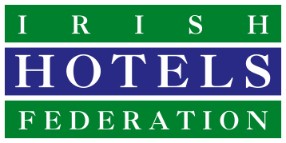
MEDIA STATEMENT
Hotels Bracing for Survival Battle as Revenues Continue to Plummet
- Industry figures show average occupancy levels of 24% for September and October
- 100,000 tourism jobs lost so far this year with a further 100,000 jobs at imminent risk
- Additional stimulus measures required to save sector, says IHF
- Urgent Government approval required for gatherings of over 6 people in hotels
-
Lack of consultation with industry remains a major challenge

Monday, 7th September 2020: The latest industry survey* from the Irish Hotels Federation (IHF) reveals the enormous challenges facing hotels and guesthouses as demand continues to plummet as a result of the Covid crisis. The impact on employment and people’s livelihoods is stark for an industry that supported 270,000 direct and indirect jobs at the beginning of the year − 1 in 10 of all Irish jobs. An estimated 100,000 jobs of these have been lost so far this year and a further 100,000 are now at imminent risk in the coming weeks.
With the summer season finished, hotels and guesthouses are now reporting a 70% drop in projected revenues for September compared to this time last year. Bookings for September/October have plunged with average room occupancy levels at 24% nationally, compared to 86% for same period last year. This follows a very challenging July and August with average national occupancy at 49%, representing an enormous drop compared the 90% occupancy achieved during these key summer months last year.
Breakdown of occupancy results for September/October 2020:
- National room occupancy: 24%
- Dublin City and County: 12%
- Other Cities: 24%
- Rest of Country (excluding cities): 30%
Regional breakdown:
- Border region: 33%
- Mid-West: 17%
- Midlands / Mid East: 22%
- South East: 41%
- South West: 31%
- West: 30%
**see note below for description of regions
Commenting on the results, Elaina Fitzgerald Kane, President of the Irish Hotels Federation, said that the figures highlight the requirement for further sector specific measures to support Irish tourism. “Our industry is operating in a quasi-lockdown. The existing supports are totally inadequate for our industry given the current restrictions. If appropriate measures are not put in place, more jobs will be lost.”
“A severely devastated Irish tourism sector would be a major loss to Ireland’s economy and society for many years to come. This can and must be avoided. We are doing everything we can to protect public health whilst also helping to restore the economy and safeguard people’s livelihoods, but we face extraordinary challenges. These have been greatly exacerbated by the additional restrictions introduced last month, including limiting indoor gatherings to no more than six people.”
“Businesses are, in effect, operating under close to lock-down conditions. This flies in the face of the detailed operational guidelines that are in place, endorsed by the HSE, HSA, HPSC and the FSAI as well as hotels’ proven track record in managing gatherings safely. It is our belief that the controlled environment provided by hotels can safely accommodate gatherings of significantly more than 6 people, which are an essential part of the fabric of Irish life.”
“A major frustration for us continues to be the lack of meaningful consultation with our industry in advance of new restrictions being announced by Government. All areas of society negatively impacted by Covid-19 should be consulted, including businesses, when developing the Roadmap for Resilience and Recovery, which is due to be published on 14th September. Public health goes hand in hand with ensuring a viable economy when this pandemic has passed.”
Commenting on the additional Government supports required for the tourism industry, Ms Fitzgerald Kane said: “The measures contained in the Government’s stimulus package do not go far enough to address the unique and existential challenges facing our industry. In particular, they fail to deliver adequate supports around competitiveness and liquidity in particular.”
The IHF is calling on the Government to implement the following measures as a matter of urgency:
-
1. Review of 6-person limit – hotels provide a very safe environment in which to hold indoor gatherings in a controlled manner. Urgent approval of a hotel protocol is required to enable indoor gatherings of up to 50 people based on 6 people per table and subject to strict time-limits, physical distancing and protocols around wearing PPE and sanitisation.
-
2. Employment Wage Subsidy Scheme (EWSS) – if jobs are to be retained, the EWSS rates of support must be increased to the previous TWSS levels of €350/€410 per week. This would make it possible for employers to retain staff during the difficult winter/spring months ahead and to facilitate training and upskilling structures designed to allow employees get personal benefit from this challenging period and to help the industry prepare for post Covid-19 recovery opportunities. Qualification for the scheme should be based on performance from March until the end of the year with payment made on a weekly basis to assist with cashflow. The scheme should be continued until the impact of Covid-19 restrictions has fully abated.
-
3. Liquidity Measures - additional liquidity measures are required to help fund hotels during the coming months as a result of the cash flow lost out due to Covid-19 restrictions, including extension of the moratorium on bank term loans from 6 months to 12 months.
-
4. Local Authority Rates Waiver - the waiver period should be extended for tourism businesses to coincide with business interruption due to Covid-19 and for a minimum of 12 months. After that, payment of local authority rates should be based on reduced levels of activity due to the crisis and until the industry has recovered.
-
5. Reduction in tourism VAT to 9% – permanent restoration to 9% to assist recovery and secure a viable and sustainable future for tourism. Reducing VAT will not only provide a stimulus in the Irish economy but also improve our competitiveness as an international tourism destination.
-
6. Testing Regime – as an island nation with an open economy, we have to restore international travel safely as soon as possible. An effective tracking, tracing and testing regime must be introduced to facilitate this and to protect the health and livelihoods of all.
- ENDS -
Media Queries:
Weber Shandwick: Seán Lawless / Ger McCarthy
Mob: 085 11 676 40 / 086 2333590
Notes to Editor:
*The survey was carried out on 31st August 2020 with 307 hotels and guesthouse responding. These hotels have a combined room capacity of 29,800 bedrooms throughout the entire country.
Tourism sector at a glance - figures for 2019
- 10.9 million out of state visitors
- Tourism accounts for almost 4% of GNP
- Total tourism revenue of €9.2 billion in 2019
- Tourism industry created over 90,000 new jobs since 2011. Before the COVID-19 crisis it supported over 260,000 jobs, equivalent to 11% of total employment in Ireland with over 60,000 of these jobs in the hotel sector alone.
- €7.25 billion in foreign exchange earnings
- €1.96 billion in domestic tourism revenue in 2019
- Total of 62,897 hotel and guesthouse bedrooms in Ireland (2019)
**Regions:
- Border region: Donegal, Sligo, Leitrim, Cavan, Monaghan
- Mid-West: Clare, Limerick, Tipperary
- Midlands / Mid East: Kildare, Laois, Longford, Louth, Meath, Offaly, Westmeath, Wicklow
- South East: Carlow, Kilkenny, Waterford, Wexford
- South West: Cork, Kerry
-
West: Galway, Mayo, Roscommon
**see note below for description of regions

 © 2020 Irish Hotels Federation
© 2020 Irish Hotels Federation